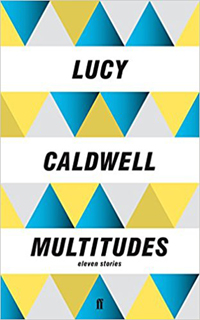
('Sunshine in Belfast' © Tobi Gaulke, 2016)
YOU’RE ONLY YOUNG ONCE
By NICOLE MANSOUR
Multitudes is novelist and playwright Lucy Caldwell’s debut short story collection. Deeply rooted in Caldwell’s native Belfast, her eleven stories follow a series of mostly female protagonists, many of them girls and young women upon the threshold of adulthood. Their lives are full of youthful drama, joy, pain; vulnerability, and of change, both emotional and physical. Set in the pre-Good Friday Agreement era, the stories are played out against a distant backdrop of the Troubles of Ireland, which Caldwell only ever alludes to and never makes explicit. The Belfast we encounter, here, feels bleak and onerous to navigate, a place wary of non-conformity and differences. Often, Caldwell’s characters are isolated and alone, or are longing to escape to somewhere else, to a life they imagine will be better than the one they are living.
In the opening story, ‘Ally Ally O’, youth and escape are ever-present themes. Told (somewhat uncommonly) in the second person ‘you’, from the perspective of the eldest daughter, the narrator describes her mother driving her and her two younger sisters up into the hills so they may see the night-time view of the city below. When they reach the look out, the mother reminisces a moment from her own youth:
When I first came over […] your dad drove me up here at dusk, to watch the lights come on all over the city. That’s when I thought, Yes, I could live here after all.
 While the mother goes on to recall other memories from her childhood – ‘Did I ever tell you we used to sing that song when I was a little girl?’ – the youngest daughter suddenly compresses her mother’s life into a single sentence: ‘When you were a little girl before you grew up and met Dad and moved here and had us’.
While the mother goes on to recall other memories from her childhood – ‘Did I ever tell you we used to sing that song when I was a little girl?’ – the youngest daughter suddenly compresses her mother’s life into a single sentence: ‘When you were a little girl before you grew up and met Dad and moved here and had us’.
In these few words, the little girl seems to capture how swiftly youth, and life, pass us by. Yet they also belie all the many complexities that come with age and experience. And it is this idea of obliviousness, of not knowing what lies ahead of us, that is symbolised by the eldest daughter in the closing paragraph, as she looks out of the car window onto the wet road: ‘…but there’s hardly anything to see, the bright moons of oncoming headlights, the red of tail lights, the rain.’
The stories that follow are full of the drama and occasional tragedy of youth. In ‘Poison’, a young woman is reminded of her teenage infatuation with Mr Knox, her language teacher, and an obsessive curiosity about his young wife, who also happened to be one of his former students. And in ‘Escape Routes’ – winner of the 2012 BBC International Short Story Award – a young girl is captivated by a video game and Christopher, her babysitter, until her world is disrupted by Christopher’s mysterious disappearance.
The tone turns darkly humorous in ‘Killing Time’, when a teenage girl attempts suicide by overdosing on paracetamol tablets for reasons that remain inconclusive. When she wakes to find herself still alive, and in perfect health, she discovers her life to be more tolerable than before:
And, to my surprise, I wake up, and things go on as usual: school, viola practice, homework. I tidy my room and learn my French vocab. The weird thing is I feel better than I have done in ages. It’s like a safety valve has been released and for the first time I can breathe again. Monday; Tuesday; Wednesday; Thursday; Friday. The week passes. It’s sort of as if things matter less now, and, because they matter less, they are more bearable.
It is only a month later, when the family dog dies, that she seems to comprehend the utter finality of death. Lying awake one night, worried momentarily that she cannot breathe, until she once again feels her breath, she is relieved to ‘concentrate only on breathing’, the small disappointments and fragile victories of life forgotten for another day.
Yet relief isn’t always reached so effortlessly. In ‘Through the Wardrobe’, a male voice (uncommon in this collection) recalls – again, in the second person – the difficulties of discovering, at age six, and with a yearning to wear one of his sisters’ Disney princess costumes, that he has been born in the wrong body. Secretly wearing the dress and posing in front of a mirror one evening while his family are all out of the house, he reaffirms what he has always known: ‘Look at yourself: how right you look, how beautiful, and remember how it feels, to feel this right, to know you’re beautiful.’
But even years later, after finding the courage to tell his parents the truth, and with the prospect of undergoing sexual reassignment surgery, he still feels misunderstood (his sisters ‘wide-eyed and whispery, flicking each other looks out of the corners of their eyes’). He promises to remember that image of himself in the ‘gold dress’, because it ‘will become a sort of talisman’, something to help him get through such a difficult, personal journey.
 The collection closes with the title story, ‘Multitudes’, a meticulously poignant piece told in fragments by a mother whose baby was born prematurely and is ill. As she sleepily waits by his cot in the hospital, hoping for signs of improvement, she reflects on a dream that brought ‘ancient wisdom’:
The collection closes with the title story, ‘Multitudes’, a meticulously poignant piece told in fragments by a mother whose baby was born prematurely and is ill. As she sleepily waits by his cot in the hospital, hoping for signs of improvement, she reflects on a dream that brought ‘ancient wisdom’:
Before we are born, we decide in advance the lives we are going to live, the events in them, the people, the choices. We decide according to the lessons we want to learn, and all of us have lived here many times over, learning new and different lessons, meeting over and over the same people in endlessly new configurations.
This passage seems to delicately encapsulate all the preceding narratives, with its reflection of youth and its bittersweet tones. And at the story’s close, when the baby is declared well and sent home, we are left, gratefully, with a sense of optimism for what lies ahead.
Caldwell’s use of the second person in several of the stories here – including her prize-winning story, ‘Escape Routes’ – may feel stylistically unfamiliar to some readers; certainly, it is often regarded among writing circles as a more ‘experimental’ point of view. But for me, it created a greater sense of intimacy, and immediacy, in her narratives, drawing me inexplicably close to the characters.
As a whole, Caldwell’s collection is a lively and poignant rendering of childhood, adolescence and motherhood, and of how we navigate the landscapes of love and loneliness throughout the course of our lives. There is a palpable tenderness to each of these finely crafted stories and a truth that will remind many of us of our own childhoods, and all those exquisite heartaches of our youth.
~
 Originally from Sydney, Nicole Mansour is a former inhabitant of Buenos Aires, Melbourne, Hong Kong and London. A graduate of Actors Centre Australia, she is currently a MA creative writing student at Chichester University. Her writing has appeared online at Wildness, Thresholds, Hong Kong Review of Books, and Graphite, and her essay, ‘Beyond the Barren Landscape: Elizabeth Harrower’s A Few Days in the Country’ was longlisted for Thresholds 2016 Feature Competition. Like Susan Sontag, she loves to read the way other people love to watch television.
Originally from Sydney, Nicole Mansour is a former inhabitant of Buenos Aires, Melbourne, Hong Kong and London. A graduate of Actors Centre Australia, she is currently a MA creative writing student at Chichester University. Her writing has appeared online at Wildness, Thresholds, Hong Kong Review of Books, and Graphite, and her essay, ‘Beyond the Barren Landscape: Elizabeth Harrower’s A Few Days in the Country’ was longlisted for Thresholds 2016 Feature Competition. Like Susan Sontag, she loves to read the way other people love to watch television.

